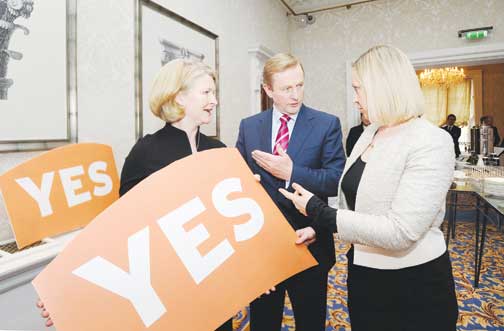


SERVICES
Tuesday May 15, 2012
Treaty Referendum Will Not Be Postponed: Kenny
Julie O'Neill from Gilead Sciences and IBEC President with Taoiseach Enda Kenny and Fine Gael Minister for European Affairs, Lucinda Creighton at the Business for Ireland Yes referendum launch (Photocall) Campaigning is in full swing for the referendum on Europe's fiscal treaty to be held in Ireland on May 31, and Taoiseach Enda Kenny has rejected calls for the vote to be deferred. The election of Francois Hollande as the new French president has opened up the prospect of a renegotiation of the treaty. Mr Hollande campaigned on a platform that he would not ratify the treaty in France unless a pact on growth was introduced alongside the austerity measures in the budget. The call has gained widespread across support across Europe including in Germany, where the opposition Social Democrats have forced Chancellor Angela Merkel to delay ratification until June. The success of left-wing parties across Europe, including in Greece, has changed the dynamic of European politics, with a new emphasis on growth and not just austerity. An EU summit has been called for May 23rd to discuss growth, with a formal protocol on growth likely to be produced from another summit in June. Given the political flux in Europe, some including Independent TD Shane Ross and trade union chief David Begg, called for the vote in Ireland to be deferred because the public could be voting on a treaty, to which something will be added after the vote takes place. But Taoiseach Enda Kenny said with the referendum campaign well underway, and whatever the outcome of negotiations on a growth protocol, it was unlikely that it would affect the Irish constitution. "Clearly from the comments from other leaders abroad there now should be a growth agenda in addition to what was already agreed and we will participate in that enthusiastically," Mr Kenny said. He said international investors wanted to see Ireland ratify the fiscal treaty. "As we are in a program, investors and potential investors outside this country are looking at Ireland now as part of Europe. They want certainty, they want decisiveness, they want clarity of a horizon," said Mr Kenny. "And I don't want to damage that in any way so the sooner we are in a position to give a clear signal about our own future, the sooner we are in a position to have continued certainty of investment coming into the country as I meet these people on a very regular basis." Fine Gael, Fianna Fail, and Labour are all urging a Yes vote in the referendum, while Sinn Fein and the Socialist Party are call for its rejection. Businessman Declan Ganley, who was considered influential in the rejection of the first Lisbon Treaty referendum, has announced that he intends to campaign for No vote. No campaigners argue the treaty's strict budget rules enshrine austerity in our budgets for years to come. Yes campaigners say it gives Eurozone countries reassurance that no-one country is allow their budgets to run out of control to the damage of the others. Opinion polls show the Yes side is winning the argument, with 53% now saying they will vote for the treaty, and 31 against with 16% undecided. One of the key elements of the treaty is that countries who do not ratify it, cannot access rescue funds through the newly established European Stability Mechanism (ESM) fund. Ireland expects to return to international markets next year to raise money through the sale of bonds, but if that sale is not successful, the country could require a second bailout. No campaigners have struggled to answer the question of where Ireland would be able to access rescue funds if it votes down the establishment of the ESM fund. |
CURRENT ISSUE

RECENT ISSUES


SYNDICATE
[What is this?]
POWERED BY

HOSTED BY

Terms of Service | Privacy Policy
Website Design By C3I






